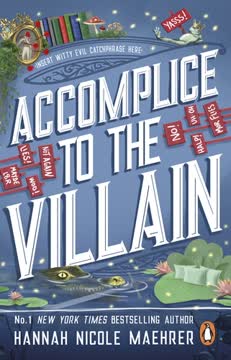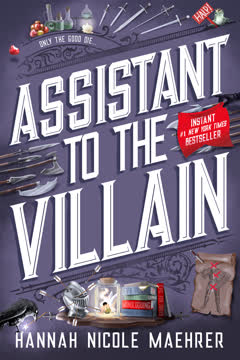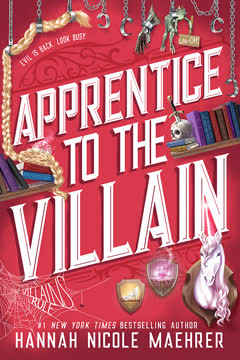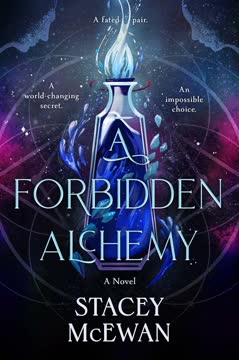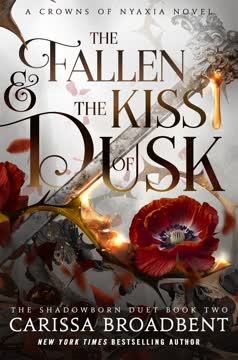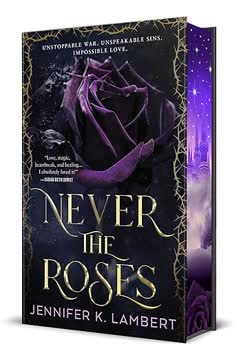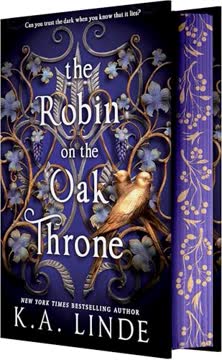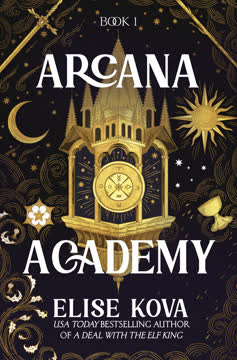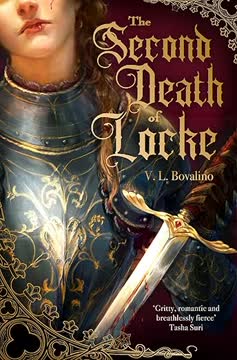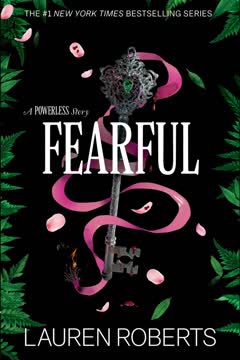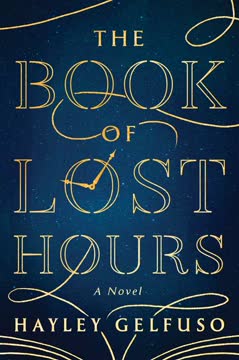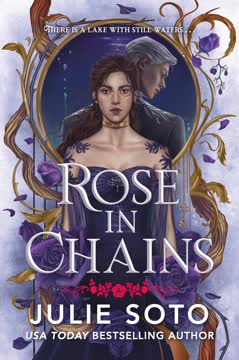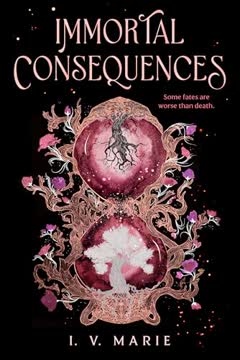Plot Summary
Early Morning Mayhem
Evie Sage's life as the apprentice to the infamous Villain is anything but ordinary. Her morning starts with a mysterious summons, a hand in the recycling bin, and a near-death experience as the manor's roof collapses. The Villain, Trystan, is disheveled and haunted by his uncontrollable death magic, which only Evie seems able to soothe. Their banter is sharp, laced with affection and tension, as Evie's irreverence both irritates and comforts her boss. The manor's staff, from the gentle Marv to the sardonic frog Kingsley, set the tone for a workplace where danger and dark humor are daily fare. Evie's resilience and wit shine, even as the screws in the manor's structure—both literal and metaphorical—begin to loosen, hinting at deeper threats to come.
Blood on Her Hands
After a two-week estrangement, Evie and Trystan's reunion is marked by blood—literally. Evie's hands are stained from defending herself in the slums, and she relishes the discomfort it causes her boss. Their chemistry is electric, but danger is never far: Trystan's magic lashes out, nearly destroying the office. Evie's quick thinking disperses the staff, but the incident exposes the volatility of both Trystan's power and their relationship. The prophecy that binds them looms, and the cracks in the manor's foundation mirror the growing instability in their world. Evie's willingness to face violence and her refusal to be cowed by Trystan's darkness set her apart, but also draw her deeper into the web of fate.
Dangerous Office Dynamics
The manor's office is a microcosm of the kingdom's turmoil. Interns are threatened by ghosts, pixies poison the cauldron brew, and sabotage lurks in every corner. Evie's family—her mother Nura, sister Lyssa, and brother Gideon—are drawn into the fray, each carrying their own wounds and secrets. Nura's return from magical exile stirs old resentments, especially in Lyssa, who feels abandoned. The staff's camaraderie is tested by suspicion: someone is helping the enemy, and the evidence points to an insider. As Evie juggles her roles as apprentice, sister, and daughter, the lines between loyalty and betrayal blur, and the cost of trust becomes painfully clear.
Family Tensions Ignite
The Sage family's reunion is fraught with unresolved pain. Nura's attempts to reconnect with her daughters are met with resistance, especially from Lyssa, who lashes out over a ruined baking project. Evie, caught between her longing for maternal affection and her anger at being left behind, struggles to maintain her cheerful facade. The family's dysfunction is mirrored in the manor's instability, as sabotage and magical threats escalate. Evie's relationship with Trystan deepens, but so does her fear of vulnerability. The chapter ends with a sense of foreboding, as the family's fragile peace is shattered by external and internal dangers.
Sabotage and Suspicion
A series of near-fatal accidents—loose screws, collapsing vents—reveal that someone is targeting Evie and Trystan. The evidence points to an insider, and paranoia spreads through the manor. Marv, the affable guard, becomes a figure of suspicion, while Evie's determination to help is rebuffed by Trystan's protectiveness. The sense of safety within the manor erodes, and the staff's trust in one another is tested. As the prophecy's deadline looms, the need to root out the traitor becomes urgent, and the cost of failure grows ever higher.
Prophecy and Peril
The kingdom's magic is fading, and the only hope lies in fulfilling an ancient prophecy. Clues point to a storybook, a magical creature called a guvre, and the need for true love's intervention. Evie and Trystan's bond is both a source of strength and a potential curse, as destiny foretells they will be each other's undoing. The search for the prophecy's missing pieces leads them into dangerous territory, both literal and emotional. As the king's forces close in, the stakes are raised: failure means the end of magic—and possibly the end of them both.
King at the Gates
The king arrives with his Valiant Guard, launching a siege on the manor. Trystan and his staff mount a creative defense, using magical pumpkins and wit to hold the line. Benedict's true aim is revealed: he wants Nura Sage, Evie's mother, as part of his own quest for power. The confrontation escalates, and the king's knowledge of the prophecy—and of Evie's family secrets—puts everyone in greater danger. The battle is both physical and psychological, as old traumas are weaponized and new alliances are tested.
Starlight Unleashed
In a moment of panic, Nura's starlight magic is unleashed, threatening to destroy the manor and everyone in it. Keeley, the loyal guard captain, sacrifices herself to save Lyssa, taking the brunt of the magical blast. The aftermath is chaos: wounds are tended, blame is cast, and the family's fractures deepen. Trystan's guilt over his uncontrollable magic grows, and Evie's sense of responsibility for her loved ones becomes overwhelming. The prophecy's shadow lengthens, and the cost of survival becomes ever more personal.
Sacrifice and Survival
The fallout from Nura's magic forces everyone to confront their deepest fears and desires. Evie's friendship with Becky, the HR manager, becomes a lifeline, as they share confessions and support. The staff's bonds are strengthened by adversity, but the threat of betrayal remains. A mysterious intruder attacks Evie, revealing the depth of the conspiracy against them. Trystan's rescue is both violent and tender, exposing the raw vulnerability beneath his villainous exterior. The need for answers—and for each other—drives Evie and Trystan closer, even as danger mounts.
Office Bonds and Betrayals
The search for the traitor intensifies, with clues pointing to forged notes and hidden motives. Interrogations in the dungeons reveal the involvement of old enemies and the complexity of the plot against the manor. Evie's skills as an apprentice—and as a torturer—are put to the test, as she navigates the moral gray areas of villainy. The staff's loyalty is both a weapon and a weakness, as trust is exploited by those with hidden agendas. The chapter ends with a sense of uneasy unity, as the true scope of the threat becomes clear.
Intruder in the Manor
An assassin infiltrates the manor, targeting Evie and nearly killing her. The attack exposes the vulnerability of even the most powerful, and the lengths to which their enemies will go. Trystan's protective instincts are unleashed, and his confession of devotion is both a comfort and a complication. The aftermath is a reckoning: wounds are healed, but scars remain, and the need for answers becomes more urgent than ever.
Interrogation and Revelations
In the manor's dungeons, Evie and Trystan interrogate the captured assassin, uncovering the identity of the traitor and the next piece of the prophecy. The magical stained glass window holds a hidden story, and its revelation brings them closer to understanding their fate. The interrogation is both brutal and cathartic, forcing Evie to confront the darkness within herself and within her mentor. The line between hero and villain blurs, and the cost of victory becomes ever more ambiguous.
The Curse Consultant
The quest to break Kingsley's curse leads the group to the eccentric Curse Consultant, Lionel, whose price for help is both absurd and revealing. The journey is fraught with magical traps, ambushes, and the ever-present threat of betrayal. The consultant's diagnosis—that Trystan himself is cursed—upends everything they thought they knew. The group's unity is tested by secrets and shifting loyalties, and the path to salvation grows more perilous.
The Pirate's Dinner Party
Lord Fowler, a flamboyant noble with a penchant for flying balloons and themed dinner parties, kidnaps the group and forces them to participate in a bizarre social event. The party is both a farce and a crucible, as alliances are forged and tested. Evie's quick thinking turns a game of hide-and-seek into a life-or-death contest, and Trystan's jealousy and protectiveness are pushed to the limit. The need for the magical wand—and the glass slippers—drives them into ever more absurd and perilous situations.
The Phoenix's Wrath
The group's journey is interrupted by a rampaging phoenix, whose pain and confusion mirror the kingdom's own. Evie's compassion and courage are put to the test as she risks her life to calm the creature, while Trystan's magic is both a weapon and a liability. The battle is a turning point, as the prophecy's pieces begin to fall into place and the true nature of heroism is revealed. The villagers' gratitude is bittersweet, as the cost of intervention becomes clear.
The True Prince's Heart
The search for the "heart of the true prince" leads to a shocking revelation: Trystan, not Kingsley, is the true prince of the prophecy. The roles of hero and villain are upended, and the cost of destiny becomes personal. The group's journey into the southern kingdom is fraught with danger, as old enemies and new betrayals threaten to undo everything they have fought for. The need for sacrifice—and for love—becomes the only hope for salvation.
The Villain's Confession
In the aftermath of betrayal and death, Trystan confesses his love for Evie in a moment of raw vulnerability. The revelation of his true parentage—and the role he was forced to play—shatters his sense of self. Evie, now revealed as the true Villain, must grapple with the weight of destiny and the pain of rejection. Their love is both a curse and a salvation, as they vow to fight for each other and for the future of Rennedawn, no matter the cost.
Destiny Rewritten
The prophecy is fulfilled, but not as anyone expected. Kingsley is restored, but at great cost; Arthur's death leaves the family shattered; and the kingdom's magic is forever changed. Evie and Trystan, now fully embracing their roles as Villain and Accomplice, stand together against the darkness, determined to forge their own destiny. The story ends with a promise: that love, even in the hands of villains, can change the world—and that the fight for hope is never truly over.
Characters
Evie Sage
Evie is the heart of the story—a young woman whose humor and compassion mask deep wounds from abandonment and betrayal. As apprentice (and later accomplice) to the Villain, she navigates a world of danger with wit and courage, refusing to be defined by her pain. Her relationships—with her family, with Trystan, and with the manor's staff—are marked by fierce loyalty and a refusal to give up on those she loves. Evie's journey is one of self-acceptance: learning to embrace her darkness as well as her light, and to claim her place as both hero and villain in her own story.
Trystan Maverine (The Villain)
Trystan is the archetypal "morally gray" villain: feared by all, but hiding a wounded heart beneath his icy exterior. His death magic is both a weapon and a curse, and his struggle for control mirrors his internal battle with vulnerability. Trystan's relationship with Evie is transformative, forcing him to confront his capacity for love and his fear of being unworthy. The revelation of his true parentage and his role in the prophecy shatters his self-image, but also frees him to choose his own destiny. His arc is one of redemption—not through heroism, but through honest, messy love.
Kingsley (Alexander Kingsley)
Once a charming human prince, Kingsley has spent a decade as a frog, forced to watch the world—and his friends—change without him. His unique perspective allows him to see truths others miss, and his silent commentary (via signs) provides both comic relief and poignant insight. Kingsley's struggle is one of identity: learning to accept his limitations, but also to fight for his own restoration. His eventual return to humanity is bittersweet, marked by loss and the realization that time—and magic—can never be fully reclaimed.
Nura Sage
Nura's return from magical exile is both a blessing and a curse for her children. Her love is fierce but flawed, and her history of abandonment leaves deep scars on Evie and Lyssa. Nura's starlight magic is both a source of hope and a catalyst for disaster, and her struggle to control it mirrors her struggle to reconnect with her family. Her arc is one of atonement: seeking forgiveness, but also learning to forgive herself.
Lyssa Sage
The youngest Sage sibling, Lyssa is both a symbol of lost innocence and a source of unexpected strength. Her ability to see through adult facades—and her own burgeoning magic—make her a key player in the unfolding prophecy. Lyssa's relationship with Evie is a touchstone for both sisters, grounding them in love even as the world falls apart.
Gideon Sage
Gideon's return is fraught with guilt and unresolved pain. His years of absence—and his complicity in the family's suffering—haunt him, but his loyalty to his sisters and his willingness to fight for redemption make him a complex, sympathetic figure. Gideon's romance with Keeley, the guard captain, is both a source of healing and a reminder of the cost of betrayal.
Becky (Rebecka Erring)
As the manor's HR manager, Becky is the voice of reason in a world of chaos. Her dry wit and no-nonsense attitude mask a deep longing for connection, which she finds in her friendship with Evie and her romance with Blade. Becky's struggle is one of vulnerability: learning to let down her walls and accept love, even when it terrifies her.
Blade Gushiken
Blade's flamboyant style and irrepressible humor make him a beloved figure in the manor, but his loyalty runs deep. His romance with Becky is a slow burn, marked by mutual respect and a willingness to fight for each other. Blade's courage in the face of danger—and his ability to find joy in the absurd—make him a vital part of the found family.
Clare Maverine
Clare's actions—both past and present—have far-reaching consequences, from the curse on Kingsley to the betrayals that threaten the group. Her relationship with Tatianna is a source of both pain and hope, as they navigate the complexities of forgiveness and second chances. Clare's arc is one of growth: learning to accept responsibility, but also to believe in the possibility of healing.
Tatianna
Tatianna's magic is matched only by her empathy, and her role as the group's healer extends beyond physical wounds. Her relationship with Clare is a testament to the power of love to endure, even in the face of betrayal. Tatianna's wisdom and humor provide stability in a world of uncertainty, and her willingness to fight for her friends makes her indispensable.
Plot Devices
Prophecy as Destiny and Burden
The prophecy of Rennedawn is the central plot device, driving the characters' actions and shaping their fates. Its ambiguity allows for misinterpretation, and its fulfillment requires sacrifice, love, and the breaking of old patterns. The prophecy's pieces—a storybook, a magical creature, a true prince's heart—are both literal and symbolic, forcing the characters to confront their deepest fears and desires. The prophecy's role as both destiny and burden is explored through foreshadowing, misdirection, and the ultimate revelation that roles can be rewritten.
Found Family and Chosen Bonds
The manor's staff and the Sage family form a found family, whose bonds are tested by betrayal, loss, and the demands of destiny. The narrative structure weaves together multiple points of view, allowing for deep exploration of relationships and the psychological impact of trauma. The interplay of humor and pain, loyalty and suspicion, creates a rich tapestry of connection that is both a source of strength and a target for enemies.
Magic as Metaphor and Threat
Magic in the story is both a literal force and a metaphor for emotion, trauma, and the struggle for control. Trystan's death magic, Nura's starlight, and the fading magic of the kingdom all serve as externalizations of internal conflict. The unpredictability of magic heightens tension and provides opportunities for both disaster and redemption. The use of magical objects—wands, glass slippers, enchanted windows—serves as both plot catalysts and symbols of the characters' journeys.
Humor and Banter as Coping Mechanism
The story's signature wit and irreverence are not just for entertainment; they are survival tools for characters facing overwhelming odds. Banter between Evie and Trystan, as well as among the staff, provides relief from darkness and deepens emotional bonds. The juxtaposition of humor and horror underscores the resilience of the human spirit and the possibility of joy even in the bleakest circumstances.
Betrayal and Forgiveness
Betrayal—by family, friends, and self—is a recurring motif, driving conflict and character development. The revelation of traitors
Last updated:
FAQ
Synopsis & Basic Details
What is Accomplice to the Villain about?
- A Villain's Unexpected Apprentice: Accomplice to the Villain follows Evie Sage, the irreverent and surprisingly capable apprentice to the infamous Villain, Trystan Maverine. Their unconventional workplace, Massacre Manor, is a hub of dark magic, eccentric staff, and constant mayhem, where severed limbs are recycling hazards and office pixies poison cauldron brew.
- A Kingdom's Fading Magic: The story plunges Evie and Trystan into a desperate quest to fulfill an ancient prophecy and save Rennedawn from waning magic. This involves retrieving a kidnapped magical creature, deciphering cryptic clues, and confronting powerful enemies, including the manipulative King Benedict.
- Love Amidst Chaos: Amidst escalating danger and personal betrayals, Evie and Trystan's complex relationship deepens. Their witty banter and undeniable chemistry evolve into a profound, forbidden love, challenging their preconceived notions of good and evil, and forcing them to confront a destiny that foretells their mutual undoing.
Why should I read Accomplice to the Villain?
- Subversive Fantasy Romance: The book masterfully blends laugh-out-loud humor with dark fantasy elements, offering a fresh take on the villain-hero dynamic. Readers will enjoy the witty banter, morally gray characters, and unexpected emotional depth that subverts traditional fantasy tropes.
- Rich Character Development: Beyond the thrilling plot, the story excels in its psychological exploration of characters. Trystan's hidden tenderness, Evie's resilient spirit, and the complex backstories of the supporting cast create a deeply engaging narrative that explores themes of identity, trauma, and chosen family.
- Intriguing Mystery & Prophecy: The central mystery of the fading magic and the unfolding prophecy keeps readers hooked, with subtle clues and surprising revelations woven throughout. The journey is not just about saving a kingdom, but about characters discovering their true selves and challenging the destinies laid out for them.
What is the background of Accomplice to the Villain?
- A World of Fading Magic: The story is set in Rennedawn, a magical continent where the balance between man and magic is deteriorating. This decline is a direct consequence of an ancient prophecy left unfulfilled, leading to widespread magical instability and environmental decay, such as "large gray patches of land leeched of color."
- Political Intrigue & Royal Conflict: The narrative is underpinned by a long-standing conflict between the tyrannical King Benedict and the enigmatic Villain, Trystan Maverine. Their rivalry is deeply personal, rooted in past betrayals and a struggle for ultimate power over the kingdom, with Benedict actively hunting Trystan and his allies.
- Interconnected Character Histories: The characters' personal histories are intricately woven into the world's lore. Trystan's past as a cursed prince, Nura Sage's magical exile, and the hidden connections between various families (Maverine, Sage, Fortis) all contribute to the complex tapestry of the plot, revealing that many current conflicts stem from decades-old secrets and choices.
What are the most memorable quotes in Accomplice to the Villain?
- "Evie Sage is meant to be your downfall, and you her undoing.": This recurring line from the destiny monster serves as a powerful thematic anchor, highlighting the fated, yet resisted, connection between Evie and Trystan. It encapsulates the central conflict of their relationship: a love that is prophesied to destroy them, yet which they ultimately choose to embrace.
- "I'm not doing this because of what they'd do. I'm doing it because it's what I do.": Spoken by Evie as she confronts the rampaging phoenix, this quote defines her inherent moral compass and burgeoning sense of self. It underscores the theme that true heroism (or villainy) comes from internal conviction, not external validation or expectation, distinguishing her from the self-serving nobility.
- "You've ruined me.": Trystan's declaration to Evie after their intimate night, delivered with a mix of frustration and profound affection, perfectly encapsulates the transformative power of their relationship. It's a villain's ultimate compliment, signifying that Evie has irrevocably altered his guarded heart and challenged his carefully constructed identity.
What writing style, narrative choices, and literary techniques does Hannah Nicole Maehrer use?
- First-Person, Shifting Perspectives: Maehrer employs a dynamic first-person narrative that primarily follows Evie, but frequently shifts to other characters like Kingsley, Gideon, Becky, and Clare. This choice offers a multi-faceted view of events, deepening reader empathy and revealing hidden motivations and internal conflicts that a single POV couldn't capture.
- Humor as a Coping Mechanism: The author's signature witty banter and comedic timing serve as a crucial literary device, juxtaposing the dark fantasy elements with moments of levity. This humor not only provides comic relief but also highlights the characters' resilience and their unique ways of processing trauma and danger, as seen in Evie's "harmless jokes" even when finding a "hand in the reuse bin."
- Symbolism and Foreshadowing: Maehrer subtly weaves in symbolic elements and foreshadowing throughout the narrative. Recurring motifs like the manor's crumbling structure mirroring the kingdom's decay, the specific details of the stained glass prophecy, and the changing nature of Trystan's magic all hint at deeper truths and future plot developments, enriching the reader's interpretive experience.
Hidden Details & Subtle Connections
What are some minor details that add significant meaning?
- The Manor's Crumbling Structure: Beyond being a setting, Massacre Manor's physical decay, with its collapsing roof and rusty screws (later revealed as perfectly intact), subtly foreshadows the internal rot and betrayal within Trystan's organization. The "natural wear" excuse for the roof collapse in the prologue is a narrative misdirection, hinting at deliberate sabotage from within, a theme that unfolds with the discovery of the traitor.
- Kingsley's Crown and Signs: The small, gilded crown Kingsley wears, originally Trystan's attempt to resize a princely ring, symbolizes Alexander's lost royalty and Trystan's enduring loyalty to his friend. Kingsley's reliance on signs for communication, and his occasional misspelling ("Halp"), subtly hint at the fading of his human consciousness, a precursor to his later "blank episodes" and the worsening of his curse.
- Evie's Scar and Dagger: Evie's glowing rainbow scar and her magically linked dagger are more than just plot devices; they symbolize her inherent connection to magic and her evolving identity. The dagger's tingling and glowing in moments of danger or strong emotion (e.g., when she confronts her mother, or when Trystan is in peril) subtly reveal her growing power and her true nature, which is later confirmed by the prophecy.
What are some subtle foreshadowing and callbacks?
- The "Danger" Sign: In the prologue, Kingsley holds up a sign reading "Danger" just before the roof collapses, a seemingly innocuous detail that foreshadows the pervasive threat of sabotage within the manor. This early warning from Kingsley, often dismissed, highlights his overlooked perceptive abilities and the constant peril surrounding Evie and Trystan.
- Trystan's "Unkempt Appearance": The prologue describes Trystan as "terrible" and "unkempt," with his magic stirring uncomfortably when he sleeps. This early detail subtly foreshadows the later revelation of his curse, which causes his magic to be "unruly" and difficult to control, especially when he is emotionally vulnerable or near Evie.
- The Stained Glass Window's Hidden Story: The kitchen's stained glass window, initially just a decorative element Evie admires, is later revealed to contain Rennedawn's prophecy. Becky's casual remark that the windows "used to depict happy things before the boss took over the manor" and were "just rearranged the bits" foreshadows the idea that the prophecy itself might be a rearrangement of truth, and that Trystan's "villainy" is a constructed role.
What are some unexpected character connections?
- Becky and Nura's Shared Past: The revelation that Becky's mother, Renna Fortis, was Nura Sage's "very best friend" adds a layer of tragic irony to the Fortis family's betrayal. This connection explains Becky's initial guardedness and Nura's deep-seated pain, highlighting how personal relationships are intertwined with the kingdom's larger conflicts.
- Keeley's Traumatic Childhood: Keeley's extreme aversion to having her hair cut, revealed during her healing, is a subtle but powerful detail that hints at past trauma. Her later confession to Gideon about her guardian "holding her down... and cutting her hair" as punishment for misbehavior reveals a deeply personal history of control and abuse, explaining her fierce loyalty to Trystan, who offered her a safe haven.
- Winnifred's Enchantress Lineage: The quiet, timid maid Winnifred is unexpectedly revealed to be the daughter of Belinda Erodina, the enchantress who cursed Kingsley. This connection is crucial for the plot, but also highlights the hidden depths of seemingly minor characters and the pervasive impact of magic and destiny on ordinary lives.
Who are the most significant supporting characters?
- Marv, the Malevolent Guard: Initially appearing as a gentle, almost comical figure, Marv's eventual reveal as King Benedict's spy is a significant twist. His unassuming nature and "gentle wave" in the prologue make his betrayal more impactful, highlighting the theme that danger can come from the most unexpected and seemingly harmless sources.
- Arthur Maverine, the Core Healer: Trystan's estranged father, Arthur, plays a pivotal role in revealing the truth about Trystan's parentage and the nature of his curse. His unwavering love and ultimate sacrifice for Trystan provide a powerful counterpoint to Amara's cruelty, offering a path to healing and redemption for Trystan's fractured family bonds.
- Lord Fowler, the Eccentric Noble: More than just comic relief, Lord Fowler serves as a catalyst for several key plot points, from revealing Trystan's curse to providing the magic wand. His flamboyant personality and "unhinged ideas" create memorable, high-stakes situations that push the main characters to their limits and reveal new facets of their personalities.
Psychological, Emotional, & Relational Analysis
What are some unspoken motivations of the characters?
- Trystan's Self-Sabotage: Trystan's constant attempts to push Evie away and maintain emotional distance, despite his obvious feelings, are driven by a deep-seated fear of fulfilling the prophecy that he will be her "undoing." His belief that he "ruins everything and everyone" (a callback to his mother's words) motivates his self-imposed isolation, even as it causes him immense pain.
- Evie's Need for Control: Evie's seemingly reckless humor and willingness to embrace "villainy" are, in part, a coping mechanism for her childhood trauma of abandonment and lack of control. Her desire to "scare them, too" and her insistence on being "well suited to this job" are unspoken motivations to reclaim agency in a life where she often felt powerless and overlooked.
- Nura's Atonement: Nura's cautious and "meek" demeanor upon her return, and her desperate attempts to reconnect with Lyssa, are driven by a profound guilt over her past actions. Her desire to "make things easier for you" and her willingness to apologize for her fears are unspoken motivations to atone for the pain she caused her daughters by leaving them.
What psychological complexities do the characters exhibit?
- Trystan's Internalized Trauma: Trystan exhibits significant psychological complexity stemming from his mother's abuse and the burden of his cursed magic. His "practiced stoicism" and "emotionless" facade are defense mechanisms, beneath which lies a "sick stomach" and "toothache" of suppressed emotion. His struggle to reconcile his "villain" identity with his growing capacity for love is a central psychological conflict.
- Evie's Mask of Humor: Evie's constant "saccharine sweetness" and "feigned innocence" are a complex psychological mask. While she uses humor to deflect and disarm, it also serves to hide her deep-seated anger, resentment, and vulnerability, particularly concerning her family's past. Her internal monologue often reveals a stark contrast between her outward cheer and her inner turmoil.
- Keeley's Loyalty and Trauma Response: Keeley's unwavering loyalty to Trystan and her fierce protectiveness of children are psychologically rooted in her own traumatic past of being controlled and punished. Her "haunted look" and physical reactions (like stiffening when her hair is mentioned) reveal the lasting impact of her childhood, making her a complex figure whose strength is born from profound pain.
What are the major emotional turning points?
- Trystan's First "I Love You": Trystan's spontaneous declaration of "I love her!" to his mother, Amara, is a pivotal emotional turning point. It's an unfiltered outburst that shatters his carefully constructed emotional barriers and publicly acknowledges his profound love for Evie, defying his mother's lifelong narrative of his incapacity for feeling.
- Evie's Confrontation with Nura: Evie's raw, honest confrontation with her mother, Nura, about her "girlhood stolen" and the pain of being left behind, marks a significant emotional release. This moment, where Evie drops her "false smile" and expresses her "anger," is a crucial step in her healing journey and her refusal to "tiptoe" through life for others' comfort.
- Becky's Confession to Blade: Becky's impulsive "I think I love you" to Blade, immediately followed by "Okay, bye!", is a major emotional turning point for her. It represents her breaking through her self-imposed emotional "impenetrability" and embracing vulnerability, even if awkwardly, demonstrating her growth beyond her guarded past.
How do relationship dynamics evolve?
- Trystan and Evie: From Boss-Apprentice to Fated Lovers: Their relationship evolves from a professional, banter-filled dynamic to one of deep, fated love. Initially, Trystan's "disgustingly beautiful" apprentice irritates him, but her resilience and humor slowly chip away at his defenses. Their physical intimacy, particularly the barn scene, marks a profound shift, as they move from resisting destiny to embracing a shared future, despite the prophecy's warnings.
- Gideon and Keeley: From Adversaries to Allies (and More): Gideon and Keeley's relationship transforms from initial animosity and suspicion ("tin can with arms") to a deep, trusting partnership. Their shared mission to rescue the guvre and uncover the traitor forces them to rely on each other, revealing mutual respect and a simmering attraction that culminates in a passionate kiss, solidifying their bond beyond professional duty.
- Clare and Tatianna: Rebuilding Trust and Rekindling Love: Clare and Tatianna's dynamic is a journey of mending a broken relationship. Tatianna's "unconditional" love and Clare's struggle with guilt over past betrayals (her correspondence with Amara) are central. Their shared moments of vulnerability and Tatianna's unwavering belief in Clare's goodness ("the world is full of color") allow them to slowly rebuild trust and rekindle their romantic connection.
Interpretation & Debate
Which parts of the story remain ambiguous or open-ended?
- The Full Extent of Rennedawn's Magic: While the prophecy outlines a path to restore Rennedawn's magic, the exact nature of its "waning" and the long-term implications of its restoration remain somewhat ambiguous. The story focuses on the immediate threat, leaving room for future exploration of the magical ecosystem and its deeper lore.
- The Future of the Royal Families: The ending leaves the political landscape of Rennedawn in flux. With King Benedict's defeat and the revelation of Trystan's true parentage, the future leadership of the kingdom and the southern kingdom is open-ended. It's unclear how the various royal lines will reconcile or if a new form of governance will emerge.
- The "Happily Ever After" for Evie and Trystan: While Evie and Trystan embrace their roles as Villain and Accomplice, and their love is solidified, the prophecy's warning ("your downfall, and you her undoing") still looms. The story concludes with a promise of continued struggle and a choice to defy destiny, leaving their ultimate "happy ending" as an ongoing, active pursuit rather than a definitive conclusion.
What are some debatable, controversial scenes or moments in Accomplice to the Villain?
- Evie's Embrace of "Villainy": Evie's increasing comfort with and even enjoyment of morally ambiguous actions, such as her "delight" in causing Trystan discomfort or her "sinister smile" when planning to "send him to his knees," can be a point of debate. Readers might question the extent to which she genuinely embraces villainy versus using it as a shield or a means to an end.
- Trystan's Torture Methods: Trystan's casual use of torture, even if directed at "lowlifes" or those who have harmed Evie, can be controversial. His internal justification ("killing by accident was a terrible thing. It was far more gratifying when done on purpose") and Evie's "curiosity" rather than disgust during these scenes challenge traditional moral boundaries and invite debate on the nature of "good" and "evil" in the narrative.
- The Prophecy's Manipulation: The revelation that the prophecy was not entirely as it seemed, and that Benedict had manipulated its interpretation for his own gain, raises questions about free will versus destiny. The idea that Trystan's curse was "to the wrong man" and that Evie was "always supposed to be The Villain" can spark debate about whether characters truly have agency or are merely pawns in a larger, predetermined game.
Accomplice to the Villain Ending Explained: How It Ends & What It Means
- The Prophecy's True Meaning Revealed: The climax shatters all previous understandings of the prophecy. It's revealed that Trystan was always the "true prince" (son of King Gavin and Queen Brina, not Arthur), and Evie was "always supposed to be The Villain" (her magic was meant for Trystan, siphoned at birth by Benedict). This twist subverts the established roles, making Trystan the hero and Evie the dark force
Review Summary
Accomplice to the Villain is highly anticipated, with readers expressing excitement over the cover reveal and release date. Many have given 5-star ratings, praising the author's writing style, plot twists, and character development. The book is described as funny, magical, and full of tension. Readers appreciate the banter, slow-burn romance, and found family elements. Some express impatience for the next installment, indicating a cliffhanger ending. Overall, the series is gaining a dedicated fanbase eagerly awaiting each new release.
Assistant to the Villain Series
Similar Books
Download PDF
Download EPUB
.epub digital book format is ideal for reading ebooks on phones, tablets, and e-readers.
